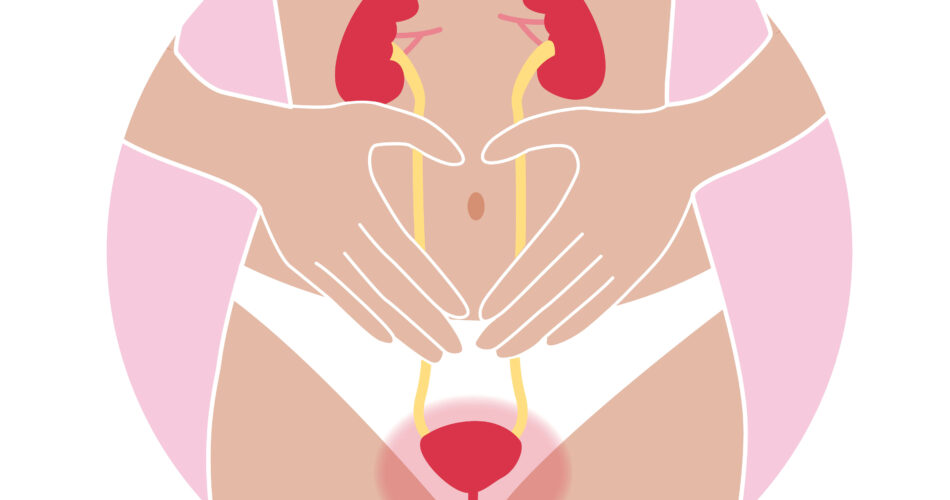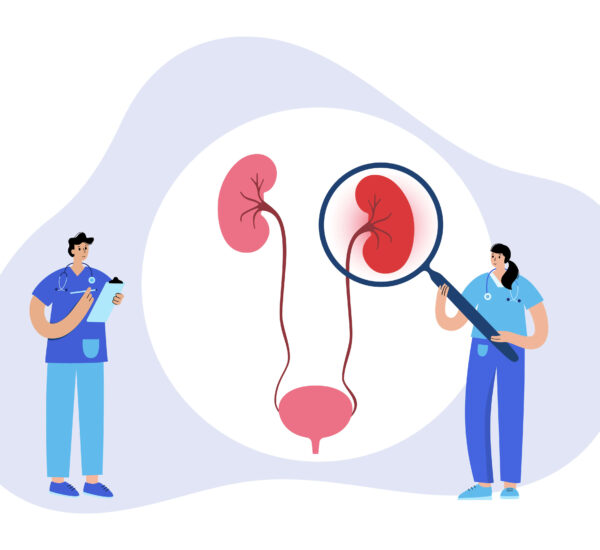A common health condition that is prevalent in women is urinary tract infection (UTI). There are several reasons why it occurs mostly in women, and that’s what we’ll uncover today. In this blog, learn the different causes of UTI in women, and how its significance can affect the overall urinary health. Let’s begin!
What is a UTI?

Urinary tract infection or UTI refers to an infection that occurs in any part of the urinary system, including the kidneys, bladder, ureters, and urethra. This condition is often caused by bacteria that enter the urinary tract and multiply, leading to discomfort and various symptoms.
It is important to note that this condition can affect the urinary system, which can be classified into different types. A lower UTI affects the bladder and urethra, while an upper UTI involves the kidneys and ureters. Both types can cause discomfort and require medical attention.
With possible spreading of the infection, the patient can experience other conditions such as the following:
- pyelonephritis: inflammation due to kidney infection
- cystitis: inflammation due to bladder infection
- urethritis: inflammation due to urethra infection
Why is UTI More Common in Women
UTI is more common in women due to female anatomy, specifically their shorter urethra. This makes it easier for bacteria from the anus to reach the front, until it reaches the bladder. Due to close proximity it is more likely for patients to be at risk of the illness.
In connection to that, poor hygiene choices may increase women’s probability of developing UTI. For instance, not washing and wiping the right way, especially when using public restrooms. The germs can move into the urethral opening and result in accumulation, which is when an infection can occur. Furthermore, if the patient is already cleared from the condition, but won’t still practice proper hygiene, that individual is susceptible to recurrent urinary tract infection.
On the other hand, another possible cause of women having UTI is related to hormones. When they reach the menopause stage, hormonal changes can lead to decreased estrogen levels, weakening the urinary tract lining and making women more susceptible to infections. In short, microorganisms can easily enter and accumulate, resulting in infection.
It’s worth noting that UTI can also occur in men, although they are less common. In men, UTIs are often associated with underlying urinary tract abnormalities or conditions such as an enlarged prostate. This gland near the penis can constrict the urine flow, which is a result of enlarged prostate. With this condition, they are required to use catheters to urinate.
Although, usage of this medical device can also be a probable cause UTI occurrence. It’s best to secure the connection, and replace as needed to avoid bacteria formation.
How the Female Urinary System Works

The female urinary system is a highly efficient system that works to prevent the entry of bacteria into the urinary tract. When functioning correctly, it effectively flushes out any harmful bacteria during urination, reducing the risk of urinary tract infections (UTIs).However, certain factors can disrupt the normal functioning of the female urinary system, increasing the risk of UTI.
This system is a remarkable network of organs that work together to eliminate waste and maintain fluid balance in the body. Understanding its anatomy and functioning can help individuals take better care of their urinary system health and overall well-being.
It is important to maintain good urinary system health by practicing proper hygiene, staying hydrated, and seeking medical attention if any symptoms of a urinary tract infection arise. Regular check-ups with a urologist can also help identify and address any potential issues with the female urinary system.
Main Causes of UTI in Women
UTI is a common health issue that affects many women. Most patients are unaware of these aspects, which makes them prone to developing UTI. It is important to note that most of these causes are common activities. Thus, resulting in a higher chance of being at risk of developing UTI.
Here are the causes of UTI in women:
Sexual Activity
This cause of UTI in women happens during sexual intercourse, in which the bacteria, escherichia coli from the genital area can enter the urethra, leading to infection. Moreover, certain sexual positions can contribute to the transmission of bacteria, increasing the risk of UTI even further. For example, positions that allow for deeper penetration may increase the likelihood of bacteria entering the urethra.
To reduce the risk of UTI related to sexual activity, it is advisable to pee or urinate before and after sexual intercourse. This helps to flush out any bacteria that may have entered the urethra. Additionally, maintaining proper hygiene, such as washing the genital area before and after sex, can also help prevent infection. It is always recommended to consult with healthcare professionals for other preventive measures that may be suitable for individual circumstances.
Hygiene
As mentioned earlier, proper hygiene plays a huge role in terms of preventing infection. Thus, making it also a cause of UTI in women when not properly done. In terms of poor hygiene practices, it can be a contributing factor to the development of an infection due to how bacteria can accumulate. With the bacteria freely growing due to improper hygiene, the more the bacteria can enter until it becomes a UTI.
Use of Certain Types of Birth Control
Meanwhile, the use of certain types of birth control methods can contribute to the development of UTI. For instance, diaphragms and spermicides may interfere with the natural protective mechanisms of the female urinary system. This interference can allow bacteria to thrive and cause infection.
It is important to discuss contraception options with a healthcare provider to find the most suitable method that minimizes the risk of UTI and meets individual needs. They can provide guidance on alternative birth control methods that may be less likely to increase the risk of UTI.
While these are some of the main causes of UTI in women, it is important to note that there can be other contributing factors as well. Understanding the causes and taking appropriate preventive measures can help reduce the likelihood of developing infection and promote overall urinary tract health.
Common Symptoms of UTI

Women with UTI can easily identify if they have a UTI. UTI symptoms usually involve the process of urination. In short, if there’s an odd occurrence during the relief period, that’s a strong sign that there’s a possible infection. Although, patients must take note that symptoms can vary in severity from mild to severe.
Here are the common signs that you have a UTI:
- Urinary urgency: The feeling of needing to urinate immediately.
- Frequent urination: Having to urinate more often than usual.
- Burning sensation during urination: A discomfort or burning sensation while passing urine.
- Cloudy or bloody urine: Urine that appears cloudy or contains blood.
- Pelvic pain or pressure: Discomfort or pressure in the pelvic area.
If you experience any of these symptoms, it is essential to seek medical advice for proper diagnosis and treatment. UTI can be diagnosed through a urine test, and treatment usually involves antibiotics to clear the infection.
Other Risk Factors for UTI in Women
Pregnancy
UTI in pregnancy is another common risk factor that women may face. It is common to happen due to hormonal changes, increased pressure on the bladder, and changes in the urinary system. Those scenarios can lead to complications, such as preterm labor, if left untreated. Regular prenatal care, proper hygiene, and prompt treatment of UTI is crucial for pregnant women.
Medical Conditions That Increase UTI Risk
Certain medical conditions can increase the risk of UTI in women. These conditions may affect the urinary system’s ability to defend against bacterial invasion, making it easier for infections to occur.
Here are the common medical conditions below:
- diabetes
- urinary tract abnormalities
- kidney stones
- weakened immune system
Visiting A Health Professional for UTI

In terms of treating UTI, visiting a health professional is crucial in ensuring proper diagnosis and treatment. UTIs can vary in severity, with symptoms ranging from mild to severe.
Women who are particularly susceptible to UTIs, must take the UTI symptoms seriously as it can affect overall health. Factors such as pregnancy, hormonal changes, and urinary system complications are just some of the risks that patients may face, which can further affect the urinary health. Thus, the importance of immediate health intervention.
If you experience any UTI symptoms, seek medical advice promptly.
Management of UTI in Women
Management of UTI commonly involves a series of treatment plans, which are tailored to fit the needs of the patients. In most cases, the doctor will prescribe antibiotics to take care of the infections. It is crucial to complete the full course of antibiotics as prescribed by your healthcare provider to ensure the infection is completely cleared.
Meanwhile, changes in lifestyle and diet are also important to help manage UTI. Patients are recommended to increase their fluid intake and avoid foods that can affect the urinary system. Drinking plenty of water helps to flush out bacteria from the urinary tract. At the same time, avoiding irritants like caffeine, alcohol, and spicy foods can also help alleviate symptoms and prevent future infections.
Final Takeaway
Dealing with causes of UTI in women has a lot at stake. Some of its effects on health don’t only affect the urinary health, but also other aspects. For instance, kidney failure can happen if the infection is not resolved right away. Meanwhile, UTI can also interfere with aspects such as the patient’s pregnancy journey. Thus the importance of prompt intervention with a healthcare professional.
Take proactive steps to reduce the risk of infection in the urinary system and overall health. Seek medical advice when needed by booking an online consultation or visiting a urologist today!



